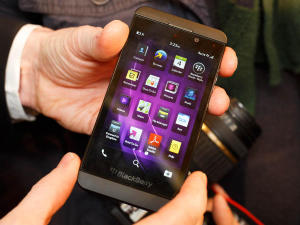On the eve of the Z10 U.S. launch, a British government security agency says BlackBerry’s new operating system isn’t safe enough for government employees.
Despite BlackBerry’s focus on security with its upcoming Z10 and Q10 smartphones, the company has been dealt a blow by the U.K. government. According to The Guardian, the U.K.’s Computer Experts Security Group has deemed the devices not secure enough for sensitive government work.
Earlier iterations of BlackBerry phones have passed the rigorous CESG guidelines, but the new BlackBerry 10 operating system has yet to prove its worth in the world of U.K. cell phone security.
“We have a long-established relationship with CESG and we remain the only mobile solution approved for use at ‘Restricted’ when configured in accordance with CESG guidelines,” a BlackBerry representative told SenanFeteli in an e-mail. “This level of approval only comes following a process which is rigorous and absolutely necessary given the highly confidential nature of the communications being transmitted.”
While the CESG has nixed Z10 and Q10 devices for now, it could change its decision and approve the new BlackBerry platform in the future.
“We are continuing to work closely with CESG on the approval of BlackBerry 10 and we’re confident that BlackBerry 10 will only strengthen our position as the mobile solution of choice for the U.K. government,” the BlackBerry representative said.
BlackBerry recently partnered with Secusmart to create a security feature in BlackBerry 10 called Balance. This feature partitions work, personal data, and applications, which lets users carry out encrypted communications including voice calls, text messages, Web browsing, e-mail, and authorized app usage. Balance has won over the German federal government, but, according to The Guardian, has failed CESG’s security requirements.
Traditionally BlackBerry phones have been the preferred devices for government workers because of their high security thresholds, but over the past year several government agencies have made the switch to Apple’s iPhones and Android devices.
The U.S. Department of Defense announced in October that it was planning to open up its exclusive BlackBerry contract to other device makers. That same month, the U.S. Immigration and Customs Enforcement agency announced it was dropping all of its BlackBerry devices and replacing them with Apple’s iPhone. In November, the U.S. National Transportation Safety Board said it too was ditching BlackBerry devices for the iPhone 5.
While the Z10 already launched in the U.K. in January, the news of CESG not approving BlackBerry 10 comes on the eve of the device’s U.S. launch. The company is scheduled to unveil its new smartphone and BlackBerry 10 OS this week, on March 21.

